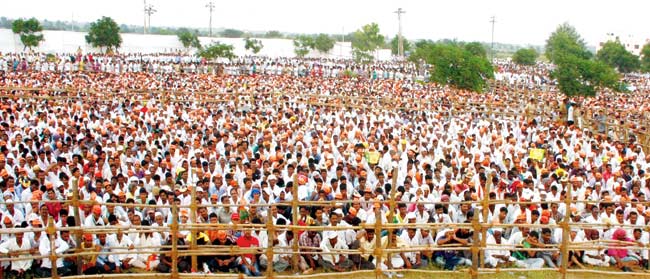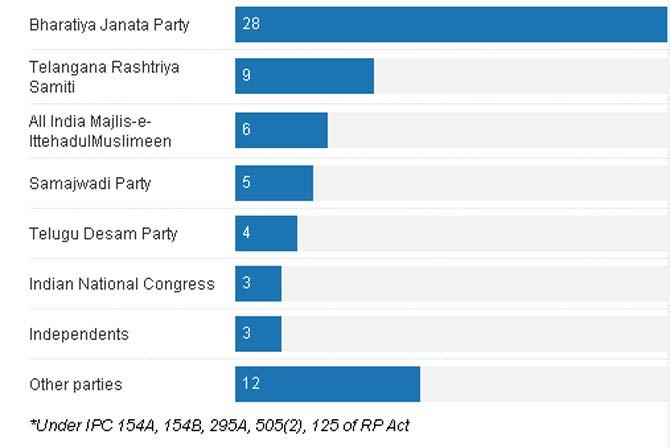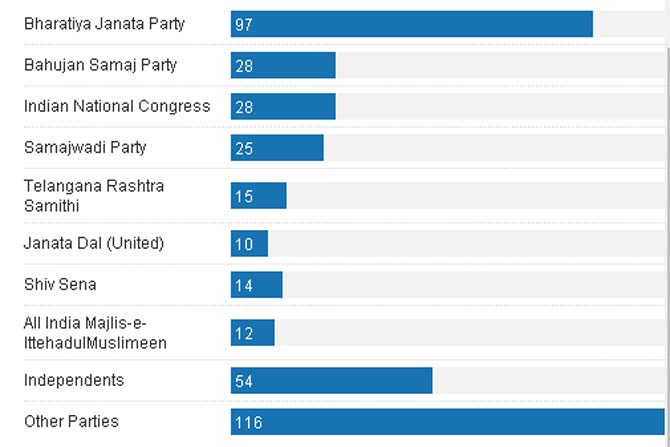Candidates with hate speech cases against them were three times more successful in elections compared to those without a criminal record, according to an IndiaSpend analysis of self-disclosed crime records of candidates who have contested various elections nationwide over the last 12 years
Candidates with hate-speech cases against them have a 30% greater chance of winning elections, according to an IndiaSpend analysis of self-disclosed crime records of candidates who have contested various elections nationwide over the last 12 years.
ADVERTISEMENT
 Representational picture
Representational picture
To put these data in perspective, candidates with no criminal cases boost their victory chances to only 10%, half that of candidates with criminal cases of any kind.
So, being a suspect in a hate-speech case provides a candidate with a better chance of victory.
"Hate-speech" Accusations & Success Rates

As many as 70 members of Parliament (MPs) and members of legislative assemblies (MLAs) have hate-speech cases pending against them, according to their own disclosures to the Election Commission (EC) of India.
28 BJP Sitting MPs/MLAs Have “Hate-Speech” Cases*

A season of hate speeches by politicians - including union ministers, MPs and MLAs - is underway across India, riven by inflamed, opposing views on nationalism and free speech.
How “hate speech” is identified, numerous laws in force
“Hate speech” currently has no specific legal definition, although the Law Commission has been tasked by the Supreme Court to do just that.
There are several sections of the Indian Penal Code (IPC) that pertain to hate speech, including:
>> 153(A)—statements aimed at creating enmity related to communal, racial, linguistic, ethnic and descent;
>> 153(B)—statements against sovereignty;
>> 295(A)—statements aimed at hurting religious feelings;
>> 505(2)—statements creating or promoting enmity, hatred or ill-will between classes; and
>> Section 125 of the Representation of the People Act—promoting enmity between classes in connection with elections.
BJP has given tickets to most number of candidates with “hate-speech” cases
As many as 399 candidates with “hate-speech” cases have been fielded by political parties in various parliamentary and state assembly elections over the last 12 years. The Bharatiya Janata Party (BJP) leads the list with 97 candidates.
Candidates With Hate Speech Cases*

How political parties violate their oath given to ECI at the time of registration
Each political party, at the time of registration, has to provide a self-sworn oath to the EC, declaring that the party will adhere to the principles of “socialism, secularism and democracy”.
A party must provide a copy of memorandum of rules, which should contain a specific provision—drawn from Representation of the People Act, 1951—that says “….and such memorandum or rules and regulations shall contain a specific provision that the association or body shall bear true faith and allegiance to the Constitution of India as by law established, and to the principles of socialism, secularism and democracy, and would uphold the sovereignty, unity and integrity of India.”
By giving tickets to candidates with “hate-speech” cases, political parties in a way violate their self-sworn oath to the EC.
 Subscribe today by clicking the link and stay updated with the latest news!" Click here!
Subscribe today by clicking the link and stay updated with the latest news!" Click here!







